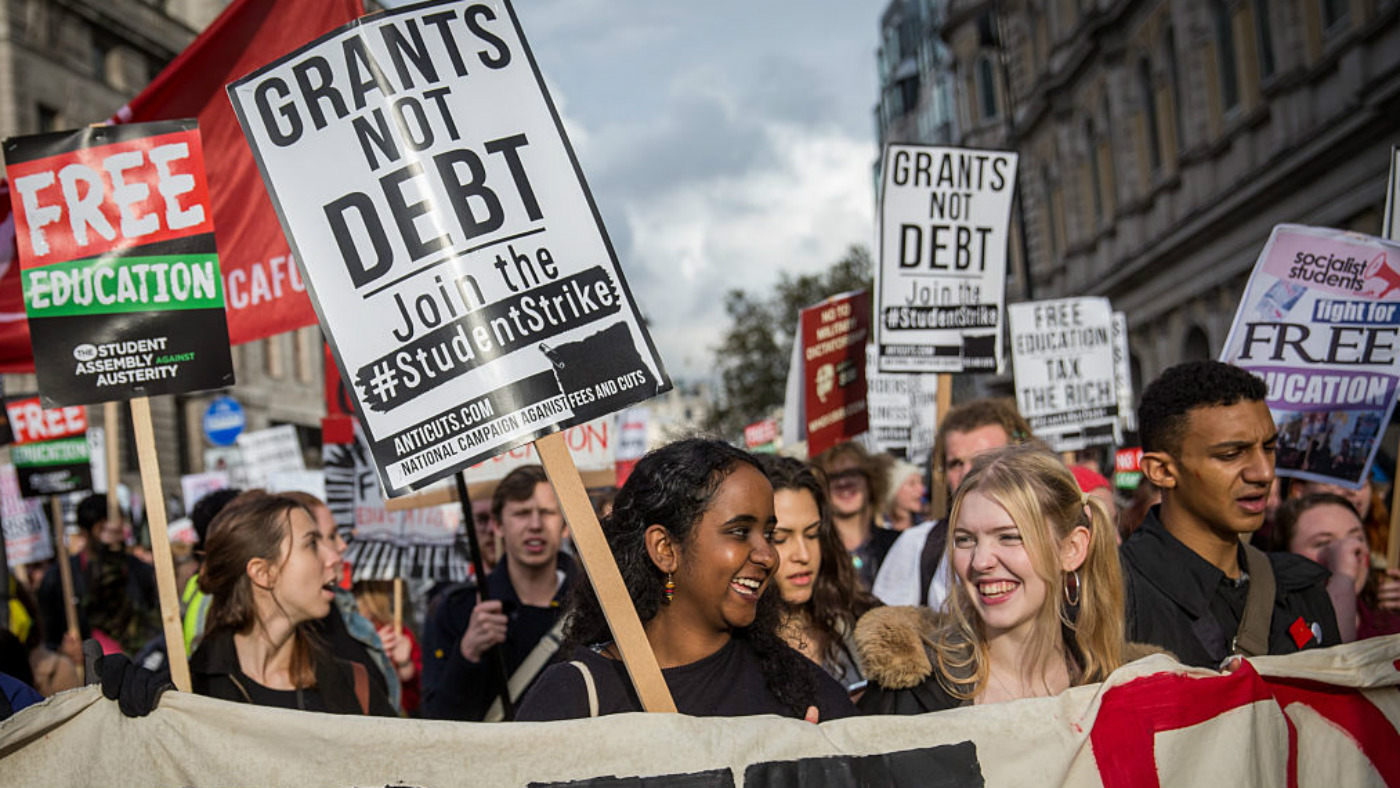Are tuition fees failing to make the grade?
Student debt is rising, but it may not matter as much as politicians say

A free daily email with the biggest news stories of the day – and the best features from TheWeek.com
You are now subscribed
Your newsletter sign-up was successful
"Poorer students will finish university with £57,000 of debt," says The Guardian.
"Three-quarters of graduates will never repay loans," reports the Financial Times.
Both newspapers are reporting on the Institute for Fiscal Studies's (IFS) paper on student loans and tuition fees in England, but come up with different takes.
The Week
Escape your echo chamber. Get the facts behind the news, plus analysis from multiple perspectives.

Sign up for The Week's Free Newsletters
From our morning news briefing to a weekly Good News Newsletter, get the best of The Week delivered directly to your inbox.
From our morning news briefing to a weekly Good News Newsletter, get the best of The Week delivered directly to your inbox.
The IFS report scrutinises the changes to the system starting from the increase in fees to £9,000 a year under the coalition.
So are poorer students paying more? Does this discourage them from going to university? And are we about to see a major policy reversal?
What does the IFS report say?
The think-tank compared the reforms legislated in 2015 and brought into force last year to those in 2012 and the system in force before, covering a period over which tuition fees have risen from £3,000 to £9,250 a year, while the taxpayer subsidy has been significantly reduced.
A free daily email with the biggest news stories of the day – and the best features from TheWeek.com
Taking the above headline claims as a starting point, the report found that after the latest reforms, the UK's poorest students have been taking on more debt and repaying more than previously, undoing all the cash benefits they'd enjoyed since 2012.
What happened in 2016?
Maintenance grants, which were offered to cover living costs and were worth in excess of £4,000, were replaced with extra loans.
As a result, poorer students are now taking on additional debt.
Under the 2012 system, the average student took out £47,000 over the lifespan of his or her course. This figure was flat across most parental income groups.
But average debt is now a little above £50,000, the highest in the western world, while students whose parents are in the lowest income groups borrow around £57,000.
There was also a five-year extension of the freeze on the £21,000 earnings threshold above which graduates must pay nine per cent of their salary towards their student borrowings.
This means all students are paying back more for longer and more of them – 77 per cent, in fact – will fail to pay off the full amount.
So are poorer students worse off?
Yes, although this is due to changes to the details of the system last year, rather than the system's major overhaul in 2012.
Tuition fees were trebled then, but universities were tasked with offering more bursaries and other support to students from poorer backgrounds. Upfront grants for these undergraduates were also increased.
Consequently, while the total debt more than doubled, the 30 per cent of students from the lowest income groups saw the amount they paid fall by around £1,500.
That has now been entirely eroded, putting poorer undergraduates in the same position as they were before the 2012 changes.
The system remains proportionally progressive, with the vast majority of loan repayments made by graduates who go on to earn the most, while the effective taxpayer subsidy is well above 90 per cent for the poorest decile and is negative for the richest 30 per cent.
Overall, though, everyone is paying back more since 2017 – £4,000 more on average.
Has this put poorer students off going to university?
There's no evidence it has. According to data published by the university admissions service Ucas, reported by Channel 4, the proportion of 18-year-olds from the poorest areas has continued to rise, hitting a new record this year.
Data up to 2015 shows that the percentage of students coming from the lowest socioeconomic groups and from state schools had also continued to increase.
However, Full Fact says overall applications rates to 2015 were around two per cent lower, which was mainly attributed to a decline in mature students.
What is the wider funding picture?
There are no doubts about how universities have fared: they are "undoubtedly better off under the current system than they were before the 2012 reforms", says Laura van der Erve, one of the authors of the IFS report.
Universities now receive about 25 per cent more in funding than they did before the 2012 reforms.
There are some caveats here – universities now get much less direct support for teaching and capital projects and must find this from their own income, says the IFS.
Consequently funding has effectively increased by around 47 per cent per student for lower-cost degrees, while higher-cost subjects such as science, technology and engineering have increased by only six per cent, something which "doesn't sit well" with government targets in these areas.
As for the government's finances, it's spending around £3.1bn less subsidising graduates and the contribution to the deficit has fallen by around £5.7bn.
Will fees be scrapped?
That's very unlikely under this government. Despite murmurings from some quarters, higher education minister Jo Johnson today branded Labour's £11bn-per-year pledge to scrap tuition fees "unaffordable", "regressive" and of benefit mainly to richer students.
But it's clear some elements of the IFS findings will be discomfiting, especially reports that poorer students are taking on more debt – even if they don't repay it ��� and have lost gains since 2012.
As in a number of other policy areas, there could be movement. Areas in the crosshairs would probably be maintenance loans for some students, above inflation interest rates that escalate debt levels quickly, or even targetted additional support for some degree courses.
-
 Secured vs. unsecured loans: how do they differ and which is better?
Secured vs. unsecured loans: how do they differ and which is better?the explainer They are distinguished by the level of risk and the inclusion of collateral
-
 ‘States that set ambitious climate targets are already feeling the tension’
‘States that set ambitious climate targets are already feeling the tension’Instant Opinion Opinion, comment and editorials of the day
-
 Mixing up mixology: The year ahead in cocktail and bar trends
Mixing up mixology: The year ahead in cocktail and bar trendsthe week recommends It’s hojicha vs. matcha, plus a whole lot more
